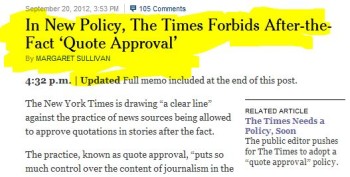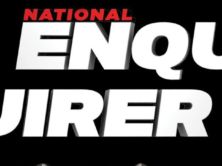
(Credit: NYT, screenshot, highlight added)
The New York Times announced Sept. 20 that it is banning allowing a “source or a press aide to review, approve or edit” quotes, the Times’ public editor Margaret Sullivan reported.
Sullivan published a memo from the Times that explains “The practice risks giving readers a mistaken impression that we are ceding too much control over a story to our sources. In its most extreme form, it invites meddling by press aides and others that goes far beyond the traditional negotiations between reporter and source over the terms of an interview.”
The memo advises:
“Starting now, we want to draw a clear line on this. Citing Times policy, reporters should say no if a source demands, as a condition of an interview, that quotes be submitted afterward to the source or a press aide to review, approve or edit.”
Sullivan noted that White House correspondent Peter Baker argued that quote approval “grew out of a laudable desire on the part of newspapers to stop using so many blind quotes in White House stories” by letting anonymous sources see what was being printed in order to get their comments on the record. Baker said, “As I recall, it was during the late Clinton era and editors pushed us to go back to sources who spoke on background and get permission to use their names with specific quotes we were planning to use anyway but anonymously.”
In response, Sullivan stated that the recently released memo permits negotiating for background information to become on the record quotes under the reporter’s “initiative,” but “quotes should not be submitted to press aides for approval or edited after the fact.”






Comments Terms and Conditions